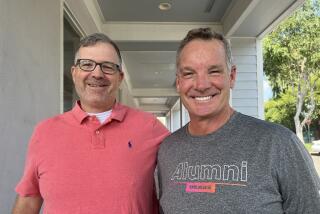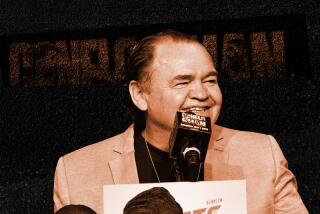Winning a Fight for Peace of Mind : Schram Wards Off an Aggressive Nature and Finds Tranquillity as Martial Arts Expert
Bruce Schram always seemed to get his kicks in the literal sense, and not necessarily for the right reasons.
Too often, Schram booted his way into trouble as a youngster. But, 19 years later, the bully-turned-black belt has channeled his aggression toward a martial arts career that has been as impressive as it has been inspirational.
Schram, 30, a dental assistant from Tarzana who won the 1989 U.S. Karate Assn. California Contact Karate heavyweight championship, possessed a temper shorter than a split-second front kick as an 11-year-old at Calabash Street Elementary School in Woodland Hills. He encountered more enemies than Bruce Lee.
“I was one of those meet-you-by-the-bike-rack kids,” he said.
Schram didn’t arrange these meetings because he wanted to showcase a new Huffy bicycle. He was huffy.
“I just felt the aggression, and I couldn’t control it,” he said. “I always wanted to see how good the other guy was.”
Today, the El Camino Real High graduate attempts to limit his challenges within a dojo (the Japanese word for a training room). Last year, Schram finished second in the heavyweight division of the World Contact Karate Championships in Phoenix. In 1987, he competed for the five-man U.S. team in the Japan Cup in Tokyo and said he was the only American to win a match.
Yet his aggression didn’t always lead to such productive venues. It often directed him to a principal’s office.
“He was always getting into fights,” his mother, Elaine Schram, said.
Schram developed an interest in martial arts with the help of a Woodland Hills neighbor, Rich Guy, who possessed a black belt in judo. Although Schram instinctively pursued martial arts for violent reasons (“I was looking for another reason to kick somebody’s butt”), his attitude quickly changed.
Guy, who taught judo’s basics to Schram in 1971, remembers his 11-year-old neighbor as ambitious and feisty.
“He was eager to learn and very competitive,” Guy said. “He had a good sense of coordination and a good mental attitude. Probably the best thing about him was that he wasn’t out there for revenge, but for knowledge to learn and better himself mentally and physically.”
Schram studied about 12-15 hours a week and earned a judo black belt at age 15. Elaine Schram initially wasn’t sure what to think of Bruce’s devotion.
“At first, I thought it was just a fleeting-fancy type of thing,” she said. “But he took it very seriously and it has really changed his life.”
Schram’s patience lengthened along with his martial arts career, and today he seeks friends as vigorously as he once sought enemies.
“Karate has given me a sense of peace and confidence that I carry over into the rest of my life,” Schram said. “It gave me focus and motivation.”
And karate, which he took up in 1973, seemed to block Schram’s path toward trouble. Although Schram has earned black belts in shorin-ryu karate-do, tae kwon do, and kenpo karate--and also has studied shaolin kung-fu and judo--he no longer loiters near bicycle racks.
“I’m a living contradiction,” he says with a smile.
That’s because Schram, who is seeded No. 1 in the heavyweight division of the 1990 USKA California Contact Karate Championships in November at Laguna Beach, now must be dragged into fights.
Although Schram is dominating at 6-foot-1 and 190 pounds, he has replaced a fast fist with an even quicker smile. Nineteen years of studying martial arts has provided Schram with an enhanced attitude that he said has changed his life.
“There are a lot of sports you can be physically good at, but karate’s spiritual aspects offer you peace of mind,” Schram said. “It was something I was looking for. I used to challenge people, but I’ve mellowed over the years.”
Schram said his discovery of inner peace helped him through trying times, such as his 1983 divorce, and he doesn’t care to speculate where he would be today if he had not developed an interest in martial arts.
“There’s an attitude with karate that instead of wanting to challenge someone to see what you can do, you feel you’re afraid of what you can do to them,” Schram said. “You know you can hurt them, and when you can understand what you’re capable of, you take the ego out of it. Once the ego is out of it, there’s really no reason to fight unless it’s purely a self-defense situation.”
Schram hasn’t entirely avoided confrontations. He recently was approached by two youths in Venice who demanded money.
“At first, I kind of laughed because I couldn’t believe it was happening to me,” he said. “But then I got angry and. . . .”
Schram teaches self-defense skills each Friday at the YWCA in Torrance. He practices and teaches for about two hours a day, four days a week. Although he says he is more passive because of martial arts, Schram remains intense during competition.
“I make (competition) as close to an attitude on the street that I can,” he said. “There are only two ways it’s going to end: either my opponent is going down, or we both go down. With that attitude, I seldom lose.”
Simon Rhee, who runs Simon Rhee’s Tae Kwon Do Centers in Woodland Hills and Van Nuys, has taught Schram for more than eight years.
“Bruce has no fear and he loves challenges,” Rhee said. “If something is difficult, he wants to do it.”
Schram emphasizes the less violent aspects of martial arts philosophy as a teacher.
“It’s not important to look for a teacher who is going to teach you violence, but one who will teach you peace,” Schram said. “The essence of karate is to refrain from violent behavior, and that’s what I try to teach. We teach peace.”
Schram feels he has satisfied his goals as a competitor and would like to concentrate on teaching. He taught martial arts while stationed on the USS Kitty Hawk during a five-year stint in the Navy, and also worked as an instructor in Japan--which is akin to a Japanese man teaching the Dodgers how to hit a forkball.
“There was a little bit of animosity initially,” Schram said. “Like anything else, you have to prove yourself. Once I did that, and they saw I was just a humble person who had something to teach, they accepted me.”
Schram receives much of his satisfaction through giving instruction, and he is attempting to start martial arts programs at elementary schools.
“People have given me so much knowledge, and I want to give some back,” said Schram.
He also is pursuing acting and writing careers. He played the role of a villain in a Japanese movie, “The Outsider,” and says he is within a year of completing an autobiography that he hopes will become a movie script.
“Karate is such a diversion,” he said. “You can paint a picture and it’s just there. You can sing a song, and it’s in the song. Well, karate is something that stays with you, something that helps you put things in perspective.”
And also keeps him from life’s bicycle racks.
More to Read
Go beyond the scoreboard
Get the latest on L.A.'s teams in the daily Sports Report newsletter.
You may occasionally receive promotional content from the Los Angeles Times.










